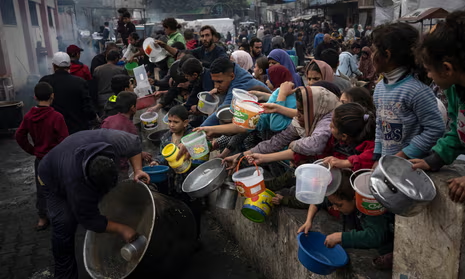Thousands of Palestinian children in Gaza are suffering from malnutrition as Israel continues to impose strict limitations on the supply of essential goods, including food, water, medicine, and fuel, according to the World Health Organization (WHO). WHO Chief Tedros Adhanom Ghebreyesus highlighted the dire situation, stating that a significant portion of Gaza’s population is experiencing catastrophic hunger and famine-like conditions. Despite reports of increased food deliveries, Tedros emphasized that there is no evidence that those most in need are receiving adequate quantities and quality of food. He reported that 8,000 children under the age of five in Gaza have been diagnosed and treated for acute malnutrition. However, due to ongoing insecurity and limited access, only two stabilization centers for severely malnourished patients are operational. Tragically, 32 deaths in Gaza have been attributed to malnutrition.
United Nations officials have expressed grave concerns about the risk of famine as Israel continues its military operations in Gaza. In January, the International Court of Justice (ICJ) ordered Israel to ensure the delivery of basic services and essential humanitarian aid to Gaza’s civilians. The ICJ reaffirmed this ruling in March, demanding that Israel take all necessary measures to facilitate the unhindered provision of urgently needed basic services and humanitarian assistance.
Some of Israel’s closest allies, including the United States, have urged for increased aid to Gaza to reach those in need. However, challenges persist. Last month, Israel seized and shut down the Palestinian side of the Rafah crossing between Gaza and Egypt, a critical gateway for aid and humanitarian workers.
The situation in Gaza has prompted significant international legal action. Last month, International Criminal Court (ICC) prosecutor Karim Khan requested arrest warrants for Israeli Prime Minister Benjamin Netanyahu and Defence Minister Yoav Gallant on charges of alleged war crimes, including the use of starvation of civilians as a method of warfare. Additionally, a UN-backed independent commission accused Israel of inflicting hunger on Palestinians. The commission’s report stated that Israeli authorities are responsible for war crimes such as starvation as a method of warfare, willful killing, directing attacks against civilians and civilian objects, forcible transfer, sexual violence, torture, and inhumane treatment.
US Secretary of State Antony Blinken acknowledged earlier this week that Israel has made some progress in removing obstacles to aid delivery in Gaza but stressed that more needs to be done. Blinken emphasized the importance of speeding up the inspection of trucks to reduce backlogs, providing greater clarity on prohibited goods, increasing visas for aid workers, and processing them more swiftly. Speaking at a Gaza aid conference in Jordan, he announced $404 million in new assistance to Palestinians and called for clearer, more effective channels to protect humanitarian workers from military operations.
The impact of Israeli attacks on aid workers has been devastating. At least 270 aid workers have been killed in Gaza, including seven World Central Kitchen employees in April, an incident that sparked global outrage. Blinken’s statements and the additional US aid aim to address these ongoing challenges and improve the delivery of humanitarian assistance to Gaza’s suffering population.
As Gaza continues to grapple with severe shortages of essential supplies and rising malnutrition rates, international calls for a diplomatic, constructive, and realistic solution to the conflict have intensified. The WHO and other international bodies continue to advocate for the protection of civilian lives and the urgent need for humanitarian aid to alleviate the dire conditions in the besieged Palestinian territory.
















